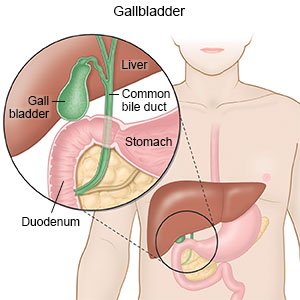Biliary Dyskinesia
Medically reviewed by Drugs.com. Last updated on Aug 4, 2025.
Biliary dyskinesia is a condition that causes pain in your gallbladder (in your upper right abdomen). The gallbladder stores bile made by the liver. Bile is used to help break down fat in the food you eat. The gallbladder has a valve called a sphincter that prevents bile from flowing out of the gallbladder until it is needed. The bile moves through a duct and into the small intestine. If the sphincter is scarred or has spasms, bile cannot flow out of the gallbladder. The bile then flows back into the gallbladder and causes pain.
 |
DISCHARGE INSTRUCTIONS:
Seek care immediately if:
- You have a fever and chills.
- Your eyes or skin turn yellow.
Contact your healthcare provider if:
- Your urine is dark.
- Your pain does not get better with pain medicine.
- You have clay-colored bowel movements.
- You have new or worsening symptoms.
- You have questions or concerns about your condition or care.
Related medications
Treatment options
The following list of medications are related to or used in the treatment of this condition.
Medicines:
- Prescription pain medicine may be given. Ask your healthcare provider how to take this medicine safely. Some prescription pain medicines contain acetaminophen. Do not take other medicines that contain acetaminophen without talking to your healthcare provider. Too much acetaminophen may cause liver damage. Prescription pain medicine may cause constipation. Ask your healthcare provider how to prevent or treat constipation.
- NSAIDs , such as ibuprofen, help decrease swelling, pain, and fever. This medicine is available with or without a doctor's order. NSAIDs can cause stomach bleeding or kidney problems in certain people. If you take blood thinner medicine, always ask if NSAIDs are safe for you. Always read the medicine label and follow directions. Do not give these medicines to children younger than 6 months without direction from a healthcare provider.
- Take your medicine as directed. Contact your healthcare provider if you think your medicine is not helping or if you have side effects. Tell your provider if you are allergic to any medicine. Keep a list of the medicines, vitamins, and herbs you take. Include the amounts, and when and why you take them. Bring the list or the pill bottles to follow-up visits. Carry your medicine list with you in case of an emergency.
Manage biliary dyskinesia:
- Maintain a healthy weight. Extra body weight can increase your risk for gallbladder problems, and can make your pain worse. Try not to gain or lose a large amount of weight quickly. This can also increase or worsen your risk for gallbladder problems. Ask your healthcare provider to help you create a healthy weight loss plan if you are overweight.
- Eat a variety of healthy foods. Healthy foods include fruits, vegetables, low-fat dairy products, lean meats, fish, and cooked beans. Ask if you need to be on a special diet. Your healthcare provider may recommend a low-fat diet. Choose healthy fats, such as olive oil, canola oil, avocado, and nuts. Omega 3 fats are also healthy. Omega 3 fats are in fish, such as salmon, trout, and tuna. They are also in plant foods such as flaxseed, walnuts, and soybeans. You may also need to avoid any foods that trigger your symptoms.
Follow up with your healthcare provider as directed:
Write down your questions so you remember to ask them during your visits.
© Copyright Merative 2025 Information is for End User's use only and may not be sold, redistributed or otherwise used for commercial purposes.
The above information is an educational aid only. It is not intended as medical advice for individual conditions or treatments. Talk to your doctor, nurse or pharmacist before following any medical regimen to see if it is safe and effective for you.
Learn more about Biliary Dyskinesia
Treatment options
Care guides
Further information
Always consult your healthcare provider to ensure the information displayed on this page applies to your personal circumstances.
